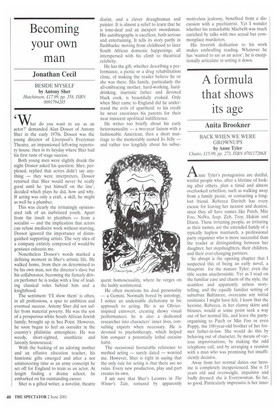Becoming your own man
Jonathan Cecil
BESIDE MYSELF by Antony Sher Hutchinson, £17.99, pp. 358, ISBN 0091794285
hat do you want to say as an actor?' demanded Alan Dossor of Antony Sher in the early 1970s. Dossor was the young director of Liverpool's Everyman Theatre, an impassioned left-wing repertory house, then in its heyday where Sher had his first taste of stage success.
Both young men were slightly drunk the night Dossor asked his question. Sher, perplexed, replied that actors didn't say anything — they were interpreters. Dossor retorted that Sher would never be really good until he 'put himself on the line', decided which plays he did, how and why. If acting was only a craft, a skill, he might as well be a plumber.
This was clearly the irritatingly opinionated talk of an inebriated youth. Apart from the insult to plumbers — from a socialist — and the implication that actors can refuse mediocre work without starving, Dossor ignored the importance of distinguished supporting artists. The very idea of a company entirely composed of would-be geniuses exhausts me.
Nonetheless Dossor's words marked a defining moment in Sher's artistic life. He walked home, from then on determined to be his own man, not the director's slave but his collaborator, becoming the fiercely driven perfomer he is today with a line of leading classical roles behind him and a knighthood.
The sentiment 'I'll show them' is often, in all professions, a spur to ambition and eventual success. Antony Sher did not suffer from material poverty. He was the son of a prosperous white South African Jewish family, brought up in Sea Point. However, he soon began to feel an outsider in the country's philistine atmosphere. He was weedy, short-sighted, unathletic and latently homosexual.
With the backing of an adoring mother and an effusive elocution teacher, his histrionic gifts emerged and after a not uninteresting time as an army conscript he set off for England to train as an actor. At length finding a drama school, he embarked on his outstanding career.
Sher is a gifted writer, a novelist, theatre diarist, and a clever draughtsman and painter. It is almost a relief to learn that he is tone-deaf and an inexpert swordsman. His autobiography is excellent, both serious and entertaining. It tells its story partly in flashbacks: moving from childhood to later South African domestic happenings, all interspersed with his climb to theatrical celebrity.
He has the gift, whether describing a performance, a picnic or a drug rehabilitation clinic, of making the reader believe he or she was there. His family, particularly the all-embracing mother, hard-working, harddrinking, inartistic father and devoted black cook, is beautifully evoked. Only when Sher came to England did he understand the evils of apartheid: to his credit he never excoriates his parents for their near innocent apolitical indifference.
He writes too briefly about his early heterosexuality — a two-year liaison with a fashionable American, then a short marriage to the memorably named Jo Jelly — and rather too lengthily about his subse quent homosexuality, where he verges on the lushly sentimental.
He often mentions his dual personality — a Gemini. Normally bored by astrology, I notice an undeniable dichotomy in his approach to acting. He is an Olivierinspired extrovert, creating showy visual performances; he is also a dedicated researcher into characters' inner lives, consulting experts when necessary. He is devoted to psychotherapy, which helped him conquer a potentially lethal cocaine habit.
The occasional favourable reference to method acting — surely dated — worried me. However, Sher is right in saying that the only rule for acting is that there are no rules. Every new production, play and part creates its own.
I am sure that Sher's L,eontes in The Winter's Tale, tortured by apparently motiveless jealousy, benefited from a discussion with a psychiatrist. Yet I wonder whether his remarkable Macbeth was much enriched by talks with two actual but commonplace murderers.
His feverish dedication to his work makes enthralling reading. Whatever he has 'wanted to say as an actor', he is exceptionally articulate in setting it down.










































































 Previous page
Previous page